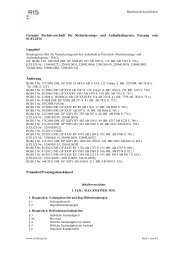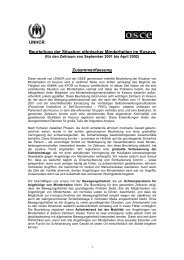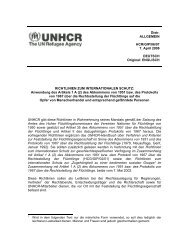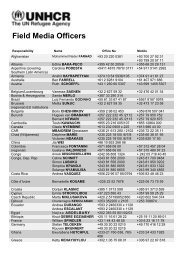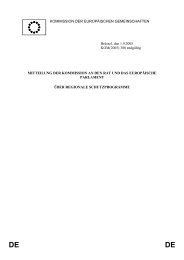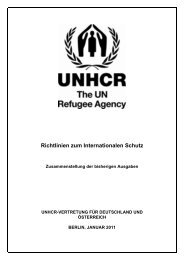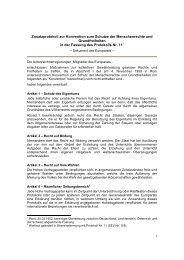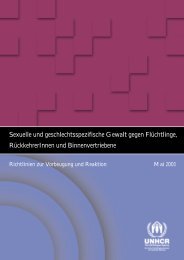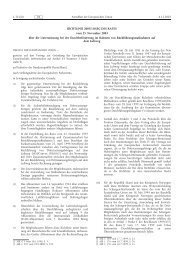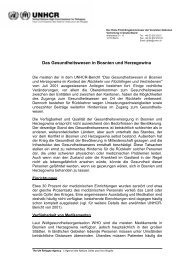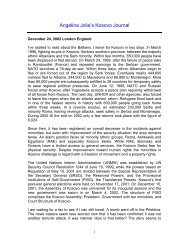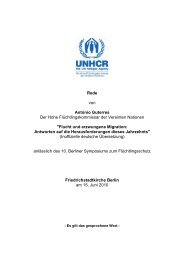Council Regulation (EC) no - UNHCR
Council Regulation (EC) no - UNHCR
Council Regulation (EC) no - UNHCR
You also want an ePaper? Increase the reach of your titles
YUMPU automatically turns print PDFs into web optimized ePapers that Google loves.
<strong>Regulation</strong>. <strong>UNHCR</strong> continues to believe that a decision to interrupt an asylum procedure on<br />
formal grounds does <strong>no</strong>t safeguard asylum-seekers from refoulement and can<strong>no</strong>t be interpreted<br />
as an ‘examination’ of the content of a claim.<br />
4. Objectives of the Dublin II <strong>Regulation</strong> and Amsterdam Treaty<br />
If the Ministry’s interpretation of the Dublin II provisions were correct and were a<br />
similar approach to be adopted by other States, the purpose and successful operation of the<br />
Dublin II <strong>Regulation</strong> – and the goal of identifying the State responsible for determining an<br />
asylum claim – would appear to be defeated. However, basic principles of legislative<br />
interpretation would dictate that an interpretation which would deprive an instrument of<br />
meaning and defeat its objectives can<strong>no</strong>t be maintained.<br />
The Amsterdam Treaty provides that Community measures on asylum shall be in line<br />
with the 1951 Convention relating to the Status of Refugees. This means that an interpretation of<br />
the Dublin II <strong>Regulation</strong> and the Asylum Procedures Directive which creates the risk of<br />
refoulement contrary to Article 33(1) would raise serious legal concerns, <strong>no</strong>t only as a matter of<br />
Community law, but also under international law.<br />
<strong>UNHCR</strong> therefore urges the Commission to pursue this matter expeditiously with<br />
Greece, with a view to ensuring that claimants returned under the Dublin II <strong>Regulation</strong> are<br />
assured of a substantive application of their claims, both in practice and under the law. Given its<br />
regular contacts with the relevant Ministry, <strong>UNHCR</strong> would be pleased to provide constructive<br />
input to or take part in any discussions with the Greek authorities which may be appropriate.<br />
In addition, <strong>UNHCR</strong> would be interested in the Commission’s authoritative<br />
interpretation of the provisions of the Dublin II <strong>Regulation</strong> and the draft Asylum Procedures<br />
Directive which are cited by Greece in support of its position. It would appear that other<br />
participating governments would also be very interested in the Commission’s guidance in this<br />
respect, especially as concerns Article 20 (1) of the Asylum Procedures Directive and any<br />
formal legal steps planned by the Commission.<br />
Finally, <strong>UNHCR</strong> <strong>no</strong>tes that Greece, like a number of other Member States at the Union’s<br />
external borders, receives a significant number of asylum applicants under the Dublin II<br />
<strong>Regulation</strong>. This is borne out by the statistics gathered as part of the monitoring process for<br />
Dublin II. Measures to encourage greater responsibility-sharing among Member States may<br />
assist in reducing the pressures on Greece and other States in similar positions, including the<br />
impact of returns of asylum-seekers under the Dublin II <strong>Regulation</strong>.<br />
<strong>UNHCR</strong>, 30 November 2005<br />
4



